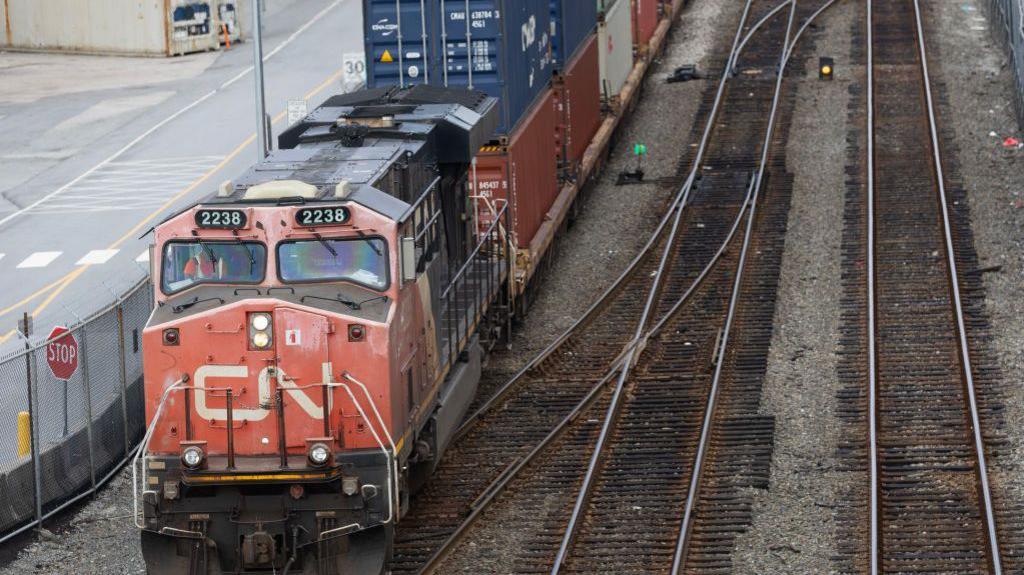Canadian rail workers begin returning to work as stoppage partially ends

- Published
Employees at one of Canada's two largest railways will return to work on Friday, partially ending an unprecedented work stoppage after intervention by the federal government.
Canada moved on Thursday to end the brief stoppage, which saw Canadian National Railway (CN) and Canadian Pacific Kansas City (CPKC) lock out some 9,300 workers after failing to clinch a deal with the Teamsters union.
The Canadian labour minister asked the federal industrial relations board to impose binding arbitration on the parties
CN said operations would resume on Friday. CPKC said it was preparing to restart operations but that timing was pending.
In addition to the back to work order, Labour Minister Mackinnon asked the Canada Industrial Relations Board (CIRB) - an independent third party - to begin the process of binding arbitration between the Teamsters and both rail companies.
Mr Mackinnon told reporters on Thursday he expected railway operations to resume "within days".
Early on Friday morning, the Teamsters union wrote in a statement posted to X that it had taken down picket lines at CN. But the Teamsters also wrote that the work stoppage at CPKC was ongoing, "pending an order" from the CIRB.
"Despite the Labour Minister's referral, there is no clear indication that the CIRB will actually order an end to the labour dispute at CPKC," the Teamsters wrote.
The work stoppage, which began on Thursday at midnight, has threatened supply chains across North America.
Canada, the world's second-largest country by area, relies heavily on rail transport.
It sends around 75% of all the goods it exports to the US, mostly by rail. A prolonged dispute could have disrupted shipments of a range of goods, from grains and beans to potash, coal and timber.
The lockout has also snarled commutes for people in Toronto, Montreal and Vancouver, where lines rely on CPKC-owned tracks.
"Workers, farmers, commuters and businesses rely on Canada’s railways everyday, and will continue to do so," Mr MacKinnon said in a Thursday statement.
"It is the government’s duty and responsibility to ensure industrial peace in this critically vital sector."
The government said that while it supports the collective bargaining process, it needed to exercise its powers under Canada's Labour Code in order to ensure important goods and trade were still being transported.
Under its orders, the CIRB will settle the disputes over the collective agreements. The minister also directed the board to extend the term of the current collective agreements until new agreements have been signed.
Labour agreements for both railways expired at the end of last year.
After months of talks, the increasingly bitter negotiations ground to a halt late on Wednesday evening with both sides accusing the other of refusing to negotiate seriously.
Sticking points in the negotiations included safety concerns and work scheduling.
CN and CPKC had both been calling for binding arbitration.
CN said on Thursday it was "satisfied" that the labour dispute would be mediated.
"The Company is disappointed that a negotiated deal could not be achieved at the bargaining table despite its best efforts," it added.
Keith Creel, chief executive of CPKC, said the government had acted "to protect Canada's national interest".
"We regret that the government had to intervene because we fundamentally believe in and respect collective bargaining; however, given the stakes for all involved, this situation required action," his statement added.
Teamsters Canada Rail Conference president Paul Boucher called the labour minister's decision "shameful".
"By resorting to binding arbitration, the government has allowed CN and CPKC to sidestep a union determined to protect rail safety," he said in a statement.
The union said on Friday it will challenge the constitutionality of a government decision the CIRB.